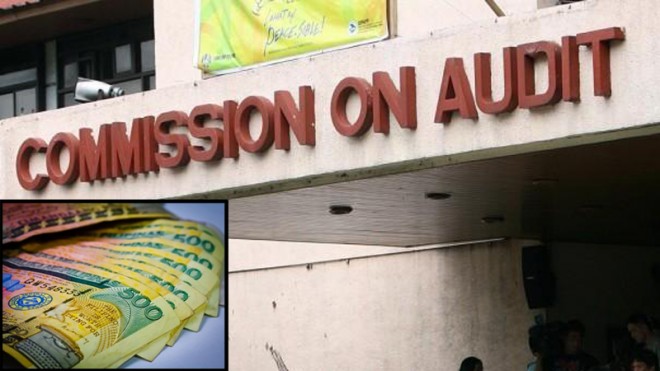
The Commission on Audit has reported that governors and mayors squandered P2.7 billion in pork barrel funds in 2013—the last year of the funds’ deployment after the system was declared unconstitutional—either because they were corrupted or misused or stashed away in their bank accounts to collect interest earnings. FILE PHOTO
MANILA, Philippines–The Commission on Audit (COA) has reported that governors and mayors squandered P2.7 billion in pork barrel funds in 2013—the last year of the funds’ deployment after the system was declared unconstitutional—either because they were corrupted or misused or stashed away in their bank accounts to collect interest earnings.
A COA summary report, posted on the agency’s website, on how local government units (LGUs) used their Priority Development Assistance Fund (PDAF) in 2013 showed that at least P1.035 billion of the allocations given by representatives and senators were used “inappropriately.”
The COA said some of the LGUs it audited in 2013 abused their pork barrel funds by using these on projects not specified in the special allotment release orders (Saro) of the PDAF or the projects identified by the legislators who gave the funds.
A number of LGUs exceeded the cash limits in paying cash advances for pork barrel projects, it said. The LGUs also did not follow National Budget Circular (NBC) No. 537 issued in February 2012 in the disbursement of funds, it said.
NBC 537 was issued to enforce strict guidelines on the use of pork barrel funds, including designating how much could be used for soft (such as medical aid and livelihood assistance) and hard or infrastructure projects and what kind of multipurpose vehicles, information technology equipment and cultural programs were allowed for PDAF funding.
Idle funds
In the wake of widespread public outrage at the alleged diversion of P10 billion in PDAF allocations to ghost projects and kickbacks, the Supreme Court ruled on Nov. 19, 2013, that the congressional pork barrel system was unconstitutional.
At the time the ruling was handed down, the COA said that P1.106 billion in idle PDAF allocations were still under the control of governors and mayors who had not returned the money to the National Treasury when they were audited this year.
The COA said this was contrary to the Supreme Court decision, which stated that the remaining PDAF funds covered by the permanent injunction shall not be disbursed but instead reverted to the unappropriated surplus of the general fund.
These funds were traced to LGUs in Metro Manila (National Capital Region) with P594.319 million; Western Visayas (Region 6) with P126.161 million; Bicol (Region 5) with P100.766 million; Calabarzon (Region 4-A) with P58.148 million; Cagayan Valley (Region 2) with P53.378 million; Central Visayas (Region 7) with P34.933 million; Ilocos (Region 1) with P33.328 million.
Fund misuse was also noted among LGUs in Mimaropa (Region 4-B) with P30.915 million; Davao (Region 11) with P26.087 million; Soccksargen (Region 12) with P26.087 million; Central Luzon (Region 3) with P22.885 million; Northern Mindanao (Region 10) with P9.590 million; Zamboanga Peninsula (Region 11) with P7.415 million; Eastern Visayas (Region 8) with P5 million; Autonomous Region in Muslim Mindanao with P 2.456 million; and Caraga (Region 13) with P870,000.
Red flags
The COA also revealed that PDAF disbursements to LGUs worth P547.082 million were red-flagged with at least 91 governors and mayors providing zero or incomplete supporting documents for pork projects, and 11 LGUs failing to indicate amounts of their disbursements in violation of the Section 4 of the Government Auditing Code of the Philippines, which required that all claims against government funds shall be supported with complete documentation.
Four LGUs implemented PDAF projects without public bidding while one LGU conducted public bidding even after the Supreme Court had banned pork barrel funds, the COA said.
Another seven LGUs did not report their receipt and use of PDAF on their websites as mandated.
The COA described the PDAF as discretionary funds to members of Congress and appropriated as lump-sum funds in the General Appropriations Act.
“[The] PDAF does not pass through the normal budgetary process of having to be initiated by the Executive branch. Its main purpose is to give legislators direct access to funding for projects that will have specific impact on their constituents,” it said.
“While legislators have the prerogative to choose the projects, their implementation is the responsibility of the agencies to which the funding allocation is directly released by the Department of Budget and Management,” it said.
The PDAF could be used only for public works, specific national defense spending, agricultural subsidies, buildings and roads, scholarships and medical expenses.
Originally posted: 6:22 PM | Sunday, December 21st, 2014
RELATED STORIES
COA to 5 cities, town: Return unused PDAF
COA: LGUs, barangays also used as pork conduits